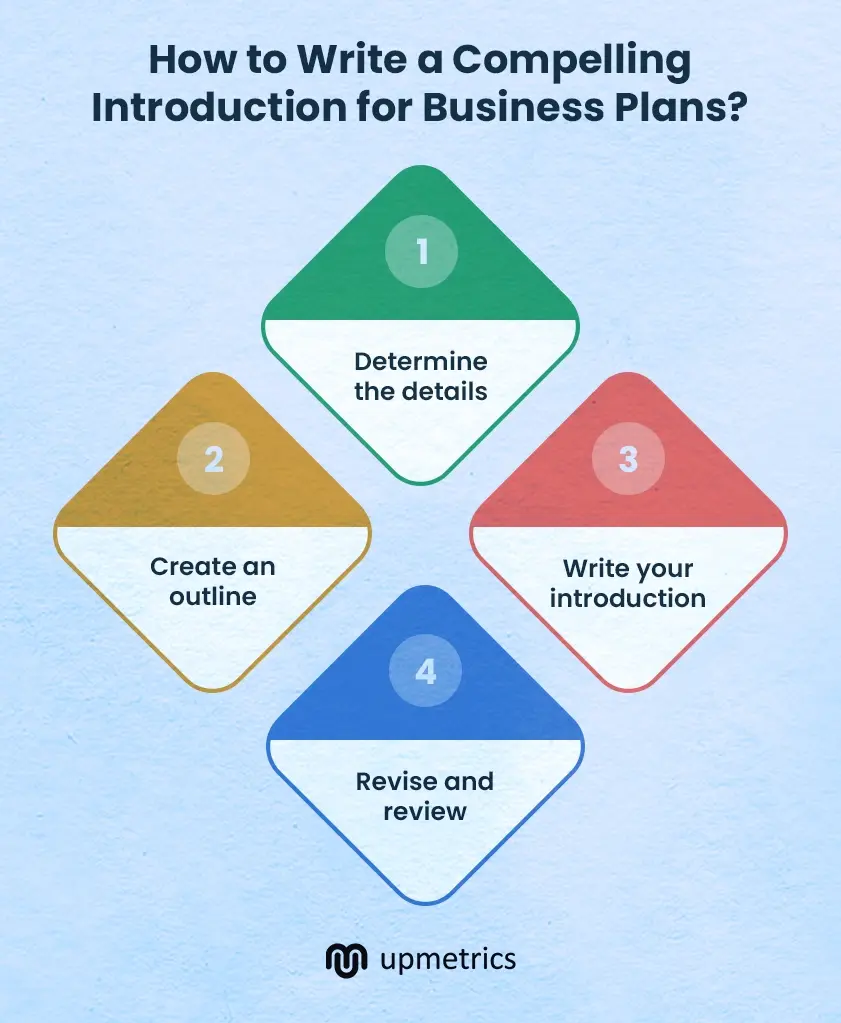

Be it a blog post, your business plan, or even a grocery list—catchy introductions can turn casual skimmers into avid readers.
Now imagine turning these casual readers into people who hang on to every word, eager to dive deeper into what your business has to offer. That’s the magic of a stellar business plan introduction!
But the main question is: How do you write such an irresistible introduction?
Well, we’ll help you with that in this blog post. We’ve also added a template and an example to enhance your overall understanding.
So let’s get started.
An introduction sets the stage for your business plan by offering context and a high-level overview of what the subsequent sections will cover.
It’s different from your executive summary and is placed right after it. Rather than summarizing the entire plan, this section of your business plan focuses on providing essential background information.
Introductions are crisp and can be anywhere between 2 paragraphs to 1 page long.
You must be wondering: Why do I need an introduction when there’s an executive summary summarizing my entire plan?
Well, primarily to set the readers’ expectations straight. With its contextual overview, an introduction helps the readers understand what details they will uncover in the plan.
Besides, business plans are quite extensive. If a reader just wants a basic business overview and understanding of your objectives, they shouldn’t have to read your entire plan. An introduction should offer that by providing a quick insight into your business.
Additionally, introductions give your business plan a professional and organized head start. It sets the tone of your plan and generates excitement amongst readers to read further.
Whether you need a business plan to establish credibility for your business or generate funds—an introduction plays a huge role in setting up your business plan for success.
Let’s now understand the process of writing an introduction for your business plan.

Wondering what you should include in your introduction and how to place it together? Check this step-by-step process and learn:
Writing an introduction gets much easier when you have a thorough understanding of what to include in it.
While there’s no fixed rule, here are a few points you can quickly touch in your introduction:
However, depending on the specialty or core focus of your plan, you can also include a general overview of a financial plan, marketing plan, target market, competitive analysis, and customer segments in your introduction.
Determine which of these will add value and context to your business plan before creating an outline of your introduction.
The introduction should be crisp and short providing clarity and purpose to the potential investors and readers.
Before you start writing, take some time to create an outline. It will help you fill in the details more quickly and efficiently.
A general outline or structure of an introduction can be as follows:
You don’t need to cover these sections in detail (specific sections of a business plan will do that). Just a line or two offering a macro overview of these aspects is enough.
Read more How to Create a Perfect Business Plan Outline?It’s now time to write an introduction by filling in the outline.
However, before that, finish writing your business plan. This will help translate the essence of your business plan more efficiently.
Now, place all the information you want to add to your introduction and weave them together in a cohesive narrative. Keep the tone persuasive and the content short.
Ask people from your team or someone professional to read your introduction.
Could they gather the context of your plan? Can they merely understand what the business does and aims to achieve from an introduction? Are they compelled to read your entire plan after reading an introduction?
If the answer to any of these questions is no, your introduction needs a revision and rework. Get it right before adding it to your business plan.
That’s how you write an introduction. Not a ninja task after all!
Introductions don’t follow a strict structure. It simply answers a few core fundamental questions and sets the tone for your business plan.
Refer to this business plan introduction template and answer its questions to structure your section.
It’s just a template. You can refine and remove these questions to suit your needs.
Refer to this introduction example for a new-age gourmet restaurant, TasteBites, in the city.
TasteBites aims to create a unique dining experience combining gourmet flavors with a cozy, family-friendly atmosphere. Positioned in the heart of downtown, our location is ideal, surrounded by offices and residential areas, ensuring a steady stream of customers seeking high-quality dining options.
Managed by culinary experts and seasoned restaurateurs, TasteBites will feature a diverse menu highlighting local ingredients, catering to various tastes while maintaining high-profit margins. Our strategic location and commitment to quality will establish TasteBites as a beloved dining destination in the community.
Introductions are supposed to be exciting and persuasive. It should offer a true overview of your business opportunity and must reflect your preparedness to start this new venture.
Don’t focus too hard on proving your business’s capabilities in this section. You have an entire plan to do so. The idea here is to excite your readers and nudge them to read your business plan further.
Now, before you work on the introduction, ensure that you have your entire plan ready. If not, use Upmetrics’s AI business plan generator to whip up a fresh business plan in less than 10 minutes.
Build your Business Plan Faster
with step-by-step Guidance & AI Assistance.